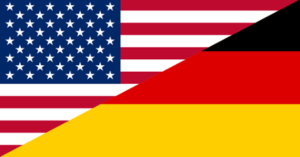Are German-American relations in a critical state? If public opinion surveys are anything to go by, perhaps so – at least according to Germans. While Americans generally still hold on to a positive image of Germany, the same cannot be said for the way most Germans view the United States. A jointly conducted poll by the Pew Research Center and the Körber-Stiftung revealed late last year that while “three-quarters of Americans see relations with Germany as good,” nearly “two-thirds of Germans (64%) see relations as bad.” More alarmingly, the New York Magazine quotes a survey conducted by YouGov revealing that Germans view President Trump as “a greater threat to world peace than any other head of state” – a noteworthy distinction, especially in light of the existence of other controversial leaders, such as the likes of Kim Jong Un and Vladimir Putin.
Considering that approval rates of the United States skyrocketed in Germany to 92% just after President Obama won his first election, the situation at the moment does indeed feel like the dreaded worst-case scenario. Nonetheless, while disapproval can be voiced of the controversial ways in which certain political leaders map out both domestic and foreign policy, it is important that Germans remember that there’s much they share with the United States – for instance one of the most significant pillars of a democratic society: a varied, open, and extremely competent press.
In spite of the Trump administration’s tendency to gloss over the truth and create “alternative facts,” the fact remains that publications within the United States have continued to display a ferocious commitment to rigorous investigative journalism and journalistic integrity. The New York Times, The Los Angeles Times and The Washington Post, for instance, are but three of the oldest newspapers that relentlessly continue to churn out both interesting and important stories, tackling everything from the Mueller report to the Uighur camps in China. The New York Times, in fact, has an entire section titled “Understanding the Times,” dedicated to explaining its fact-checking practices and journalistic decisions. It is undoubtedly reassuring to know that the institutions that define journalistic excellence within the U.S. are committed to transparency. On our side of the Atlantic, the situation is comfortingly similar: publications, such as Der Spiegel, Die Zeit, the FAZ, and Süddeutsche Zeitung all continue to play important roles in broadening national conversations about current issues, thus denouncing the dangerous rhetoric of extremists.
Look back just a little further and you’ll see evidence of German and American journalists working together in unceasing pursuit of exposing the truth. The publishing of the Panama Papers in 2016, for instance, brought together close to 400 journalists from more than 100 media organizations in over 80 countries in exposing a wide-scale tax evasion scandal. This was headed by none other than the International Consortium of Investigative Journalists (ICIJ) – an American-based and American-run non-profit organization whose international network of journalists aims to “collaborate on groundbreaking investigations that expose the truth and hold the powerful accountable, while also adhering to the highest standards of fairness and accuracy.” Also noteworthy in this case is the fact that it was a German newspaper – the Süddeutsche Zeitung – that received the first tip-off from a whistleblower.
While the fact remains that the image of a country is inevitably tied to its prevailing figureheads, we must also remember that they are but part of a bigger picture. America is the sum of many parts but, concomitantly, it is also defined by its unshakeable values of democracy and freedom of speech. Importantly, it remains a beacon of journalistic transparency and excellence. On that basis, our skeptical attitude towards the U.S. is worth reconsidering.
17,398 Total Views, 5 Views Today







